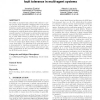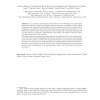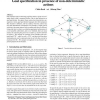857 search results - page 160 / 172 » A Logic of Emotions for Intelligent Agents |
ATAL
2009
Springer
14 years 2 months ago
2009
Springer
The ability to guarantee that a system will continue to operate correctly under degraded conditions is key to the success of adopting multi-agent systems (MAS) as a paradigm for d...
ILP
2007
Springer
14 years 1 months ago
2007
Springer
A recurrent question in the design of intelligent agents is how to assign degrees of beliefs, or subjective probabilities, to various events in a relational environment. In the sta...
ECAI
2004
Springer
14 years 1 months ago
2004
Springer
Knowledge-based programs (KBPs) are a powerful notion for expressing action policies in which branching conditions refer to implicit knowledge and call for a deliberation task at e...
GLOBAL
2003
Springer
14 years 27 days ago
2003
Springer
Klaim (Kernel Language for Agents Interaction and Mobility) is an experimental language specifically designed to program distributed systems consisting of several mobile component...
ECAI
2004
Springer
13 years 11 months ago
2004
Springer
One important aspect in directing cognitive robots or agents is to formally specify what is expected of them. This is often referred to as goal specification. For agents whose act...



